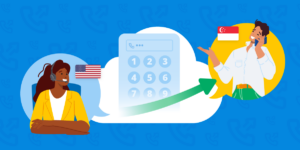Your Guide to Voice Termination

Trends Towards Dedicated Voice Stay Strong
The world continues to adopt virtual communications at an astonishing pace. While some speculated that the surge in demand for hosted voice in 2020 was a temporary market shift, companies worldwide continue to embrace modernized communications. Work from home is a cultural hit, and the hybrid work model is working better for global companies than anyone could have (confidently) predicted.
We want to equip you with the knowledge you need to make confident, competent decisions about your voice termination needs. Today we're simplifying some of the complexities of global telecom so that you feel prepared to make the best choices for your voice termination needs, starting with call origination and termination.
How Call Origination & Termination Work in VoIP
Voice over Internet Protocol (VoIP) refers to the process of making calls over the internet. VoIP calling benefits the user by requiring no special equipment beyond a mobile-compatible phone, tablet or computer, mobile network data and access to the internet. VoIP calling is usually cheaper and less restrictive than landline-based telephone services.
VoIP is similar to the traditional PSTN in that calls might travel across several networks before reaching their recipient. Traditional telephone carriers have agreements in place to accept or pass through calls placed from outside networks so that end users can enjoy an uninterrupted conversation.
The same is true for VoIP providers. They work together to connect calls from one location to the recipient number, or destination. Call Origination is where the number is dialed from, while Call Termination refers to the location of the recipient.
What is VoIP Termination?
The process of patching through calls from one VoIP phone to another is called VoIP Termination. You might see esoteric definitions laid out like this:
VoIP Termination refers to the procedures that route telephone calls from one provider to the next provider until the call is routed to the last telephone company and received by the recipient.
That’s a mouthful! You can think of VoIP Termination as telephone carriers mutually agreeing to connect callers around the globe so calls can connect people between any location.
So, a VoIP service provider is a type of carrier that ensures your outgoing calls are connected to your recipients via their network and/or partner networks. VoIP Termination services are also responsible for security, audio quality, and least-cost-routing for those calls, as well as any other solution standards laid out in their service level agreement.
Common terms you'll see in this article or others as you continue your research include:
- A-Z VoIP Termination: A-Z VoIP Termination is normally used in reference to a provider's complete list of rates for outbound calls to all available countries, beginning with Afghanistan and ending with Zimbabwe.
- SIP Termination: SIP stands for Session Initiated Protocol. SIP is one method of VoIP call connection, although "SIP" termination is usually used interchangeably with "VoIP" termination in online content.
- SIP Trunking: SIP Trunking is the connection between your phone system and an external voice service. SIP Trunking can be used for VoIP Origination, VoIP Termination, or 2-way voice services.
- VoIP Origination: While VoIP Termination services are concerned with the delivery of your outbound calls to your destination, a VoIP Origination service refers to the inbound phone numbers and service used to manage incoming calls.
Who Uses Voice Termination Services?
There are several types of organizations that benefit from a reliable Voice Termination service provider. The most common use-cases include:
- BPOs & Call Centers
- Partnered Services & Enterprises
- Embedded Communications
BPOs & Call Centers
BPO, or business process outsourcing, are outsourced call centers that handle aspects of your business operations that your staff either doesn’t have the bandwidth to complete or can't perform efficiently. Running an efficient sales or service call center requires major time and investment, and BPOs manage those operations so your company doesn't have to worry about all the work that goes into setting up the technologies, negotiating pricing, staying compliant, hiring & training agents, and so on.
Because BPOs manage call center operations for multiple companies or sometimes a single enterprise, it's easy to see why a dedicated Voice Termination provider is required. Dropped calls and frequent call quality issues are disastrous to a BPO's operations, and even a small difference in VoIP Termination rates makes a huge difference on your bottom line when your agents are making thousands of outbound calls per month.
Partnered Services & Enterprises
Enterprises and medium sized businesses with international calling needs frequently partner with VoIP Termination providers. The reasons are the same as with a BPO - when you have that many agents on the phone making thousands or even million minutes of outbound calls per month, any lags in your QoS standards are devastating and even a small reduction in call termination rates makes a major difference. Enterprises usually use SIP Trunking to integrate these dedicated voice services into their existing systems. A common example of this is when companies use Microsoft Teams as their virtual phone system, but opt for Direct Routing with a partner like AVOXI rather than settle for limited Calling Plans.
Partnered services may also include resellers or "channel partners." These are other voice services or unified communication platforms that partner with one or multiple call termination providers to improve their own service offering in regions where their network is lacking. Arrangements like this are even common with your major cable providers, who bundle VoIP services with their internet and broadcast/cable media products to offer their commercial and residential customers the convenience of purchasing all media-related services in one place.
Embedded Communications
Calling apps such as WhatsApp, Facebook Messenger, Skype, or Apple’s FaceTime rely on VoIP Termination services to carry out calling features. Calls placed from mobile apps often travel through several networks before they reach their end point, especially if the recipient resides in another country. The extras that come with many of these apps—video chat, file sharing, SMS—are part of the data packets transferred through the cloud and reassembled at their destination device thanks to the call features bundled within these apps.
The programmable voice APIs required for those functions can also be used by partners to embed products into their own platform or shopping cart. For example, if you are looking at an international voice provider's online shopping cart for available numbers, there's a chance some of the numbers being displayed are actually from AVOXI's shopping cart and being displayed via phone number API!
8 Reasons Organizations Use VoIP Termination Services
The business cases for a great VoIP Termination provider are endless, but we've filtered out list down to 8 no-brainer reasons to take advantage of these services. Common business benefits of partnering with a reliable Call Termination service include:
1. Outbound CLI (Local Voice Termination)
Want more people answering your calls? Use a local number as your outbound caller ID! Sounds easy, but of course, international telecom never so simple. The ability to use Local Caller ID in target markets is a top priority of most companies when choosing their VoIP Termination providers. Companies that don’t display a familiar caller ID may miss out on more than 75% of answered calls (Software Advice).
Call Termination service with guaranteed outbound caller ID is known as Local Voice Termination. Local Caller ID service prevents poor answer rates in your target markets, especially during international calls.
2. Expanded Call Coverage
VoIP providers usually offer a wider variety of international phone numbers than traditional phone service providers. In terms of the ability to reach people, VoIP offers greater access to phone numbers in hard-to-reach places such as app-based numbers, PBX-based lines or accounts within unified communication platforms (like Teams).
Connecting with a global voice provider in your target markets gives you worldwide call coverage, also known as A to Z Termination. These arrangements often expand your inbound number coverage as well. For example, AVOXI partners have the ability to provision inbound virtual numbers from 150+ countries within minutes, all from one intuitive user interface. This includes rare number types other providers struggle to obtain in Australia, India, Nigeria, the UAE, and many more.
3. Friendly User Experience
Partnering with reliable Call Termination providers means your business is not responsible for maintaining your telecom network, freeing you to focus on the daily operations and goals that drive your business success. There’s no need for additional IT staff, and live phone support is available 24/7 when you choose a reliable provider like AVOXI.
4. Price Reduction (Wholesale Call Rates)
VoIP Termination rates are more affordable (and much easier to work with) than PSTN-based services in practically every scenario companies may find themselves in. This is especially true for businesses that qualify for wholesale voice termination rates. In addition to the time savings and reduced headcount requirements when using a voice provider, wholesale VoIP partnerships unlock the most competitive call rates vendors are able to offer. Learn more about flexible Voice Origination and Voice Termination partnerships with AVOXI→
5. Automated Work Flows
If your business opens a new office, goes remote or sends representatives overseas for an event, your VoIP network follows you. There’s no need to install new hardware or configure new server rooms. Take advantage of unified communications and integrate your voice service with your CRM and other technologies to automate tasks and free up your agents to communicate with customers. See our ever-growing list of CRM, helpdesk, and business tech integrations →
6. PSTN Replacement
If your business and customer base are all within your local or regional area—meaning you could rely upon the local telephone network for all phone service needs—contracting with a VoIP provider could still benefit your company. The VoIP provider could offer a full suite of business call services most local phone vendors can't match, and at more affordable rates!
7. Consolidated Technology for Unified Communications
Almost all VoIP providers offer some level of unified communication integrations. You and your employees can continue to use the systems you’re familiar with without sacrificing productivity.
Need to upgrade your system or planning a rip-and-replace migration to a cloud phone system? No problem. Your VoIP provider will handle those changes in the cloud. Technology upgrades happen online, too. Meaning a simple download of the new tech and a reboot of your computers puts your phones back on the same page.
8. Superior Call Quality (Especially Internationally!)
VoIP providers continuously work to solve the inconveniences of dropped calls, post-dial delays, poor audio quality, and other annoyances that can crop up, especially when making long-distance calls. Most providers guarantee a good connection no matter the location of the outbound/inbound caller. It’s the VoIP provider’s job to route your calls efficiently. They maintain backup systems so if technical errors crop up, your phone service will continue uninterrupted. Learn about the resilient network powering AVOXI's voice services →
Understanding VoIP Termination Providers
VoIP Termination service is the process your carrier takes to ensure your VoIP calls reach their intended destination without being dropped and with as high quality as possible. As the number of carriers that you rely on to place outbound calls increases, so does the chance of something going wrong. To address this, VoIP Termination services continuously optimize these outgoing call routes on their network and then pass those benefits on to companies or partners that use them to host their outgoing calls. If you’re conducting a video call, or using a UC that allows audience chat or file transfer while on a call, VoIP Termination services also ensure your data transfers seamlessly.
Because there are so many use-cases that companies use Call Termination services for, the first thing you should look at with potential VoIP services is the type of organizations their service is built around. For example, is the provider focused on Voice Termination routes in the US & Canada but also offer some international services, or are they focused on primarily on international call traffic? Do they offer local VoIP Termination, and if yes then where can they ensure local caller ID and which destinations are best effort? And of course, are they a Tier 1, Tier 2, or Tier 3 voice provider?
We'll cover best practices for vetting potential voice providers in a future article, but this free guide wouldn't be complete without addressing the tiers of VoIP providers and why that matters. There are three main network categories of VoIP companies, known as "tiers."
The 3 Tiers of of VoIP Termination Providers
VoIP providers, or telecom carriers in general, can be broadly categorized into three categories; Tier 1, Tier 2, and Tier 3. The differences between tiers of telecom carriers come from the way in which their network operates. Let’s explore each tier in more detail.
Tier 1 Telecom Carriers
Tier 1 telecom carriers are large organizations that own their own infrastructure and maintain a network with direct connections between all points. These large carriers have peering agreements with Tier 2 and sometimes Tier 3 carriers, but always prioritize their own traffic first. There are only a handful of Tier 1 carriers in the world.
Tier 2 Telecom Carriers
Tier 2 telecom carriers have peering agreements with one or more Tier 1 carriers. While many Tier 2 carriers simply piggyback off a Tier 1 network, some run a hybrid network where they own their own infrastructure in certain regions and/or maintain direct connects with multiple Tier 1 carriers and run calls through the carrier best suited for that call based on when and where the calls take place.
Tier 3 Telecom Carriers
Tier 3 telecom carriers are startup carriers or niche providers that works through one or more (usually more) Tier 2 carriers to host their customers' calls.
The Reliable Choice for International VoIP Termination
Interested in reliable, high-quality Voice Termination around the world? If that's a yes, you're in the right place! We encourage you to arm yourself with knowledge around VoIP call termination. Leverage these best practices for Local Caller ID, so you can make a confident decision about these number types.
AVOXI is here to deliver the highest ROI for any organization we partner with. The reason so many organizations trust AVOXI is our global number footprint and international voice expertise.
Related Articles
Contact Center Phone Numbers: Best Practices to Optimize Your Global Reach
Grow your contact center’s phone number portfolio and optimize global reach using virtual number best practices. Learn how it improves your voice engagement and more.
Which Numbers Can I Make Outbound Calls From?
Not all number types have the capabilities to make outbound calls. Learn the ones that do and more here.
Why International Companies Need Local Presence Dialing & Caller ID Service
Why International Companies Need Local Presence Dialing & Caller ID Service Reaching customers and sharing a connection with them is…



